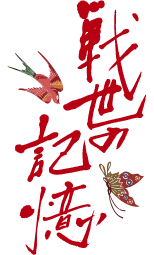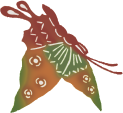
We carried the sick and injured into foxholes whenever we heard an air raid siren
We carried the sick and injured into foxholes whenever we heard an air raid siren
Name: Haru Iramina (born on Kuroshima Island) (02伊良皆ハル)
Age at the time: 26 years old
Position at the time: Housemistress, Okinawa Airakuen (a sanatorium for leprosy patients)
Location: Northern part of Okinawa Island
[I was disliked because of my illness]
I will never forget what happened that day. I was 12 years old and this occurred around the third period on Saturday, during the first term of my fifth grade. Two students sat together on each seat, but the one who usually sat next to me was not there that day because a sibling had passed away.
Someone wanted to sit next to me, so I let her sit there, but then someone else said "That kid has Hansen's disease (leprosy)." Then all the students from fifth grade, even the six graders that were near me, pulled away to the left and right, in front of me and behind, leaving me on my own in the middle. I was only 12 years old at the time, but I remember suffering so much that I even wanted to jump in a well and die. In those days, once you get Hansen's disease you could not walk on the street and so I stayed in the house out of view from other people for seven or eight years. When I moved from Kuroshima Island to Ishigakijima Island I was not allowed to board the same boat as all the others, but instead I was wrapped in a blanket to keep me out of people's view and I was loaded onto a plank-built fishing boat that took me to Ishigakijima Island. I guess that was unavoidable at the time. I was disliked so much. No one would talk to me. They thought they could contract the disease by talking to me, so no one would talk to me. Everyone avoided me.
[Air raid warning]
My hands were not very deformed at that time, so when we heard the air raid warning, I used both my arms to carry the person next to me on my back and we escaped to a foxhole. I only had the use of one hand, so I almost dropped that old lady. Someone else wanted my help, so I told her "Please sit and wait here. I am about to drop this old lady and I have to take her into the foxhole first, before I come right back for you," but she started crying profusely. I sat the old lady down inside the foxhole and then returned to the other lady and carried her on my back to rescue her.
I was just doing that sort of thing over and over again. Perhaps that is why my life was spared.
There was a time when the pilot of an American aircraft spotted me and almost killed me. There was no water in the foxhole, so I was washing dishes near a well and while I was doing that three aircraft flew over and started dropping bombs over my head. There was a sanatorium nearby, so I went there and was saved.
[Washing diapers of patients]
The bombs did not hit the hospital, but whenever an air raid warning was sounded, we carried the patients on our backs into the foxholes and, once the warnings were called off we carried them back and laid them on their beds. Once one of the patients was sulking and told me "I don't care if I die so I am not going," I asked "Are you sure that is what you want?" and I left her there at first, but as soon as the hail of bombs started dropping down I went back to see how she was. When I got there she was asking for my help, saying "Come quickly and take me away from here!" so I carried her on my back and took her out with me. When it comes down to it, it does not matter what kind of people they are, people ask for help because of the immensely terrible nature of bombs.
In the sick ward, people continued to die from diarrhea every day. I washed large quantities of diapers in the ocean because of the diarrhea, but it was so extremely cold, and I cried. "Why do I have to do a thing like this?" I thought to myself. When I was washing in the sea to remove excrement, tears came flowing out of my eyes because I did not even do this much for my own parents.
[Air raid of 10-10 (October 10th 1944)]
I could not take even one step outside. Perhaps they thought soldiers were in the houses, because bombs just kept falling on us, and we lost all the houses. They were not built with cement they were just thatched roof houses, so nothing remained.
[A message for peace]
There must never be another war. That's why I hate the presence of military bases. Okinawa is forced to bear so much. I think Americans have no scruples. They look down on us. We suffered so much during the war. I suffered from Hansen's disease but I also suffered because of the war.
As long as we have military bases, there will be battles here. When I think of that, I pity my children and grandchildren. War is truly dreadful because bombs are dropped on you from aircraft up in the sky and you are bombarded by battleships at sea. I ask you to never have a war again. I plead with you.
Name: Haru Iramina (born on Kuroshima Island) (02伊良皆ハル)
Age at the time: 26 years old
Position at the time: Housemistress, Okinawa Airakuen (a sanatorium for leprosy patients)
Location: Northern part of Okinawa Island
[I was disliked because of my illness]
I will never forget what happened that day. I was 12 years old and this occurred around the third period on Saturday, during the first term of my fifth grade. Two students sat together on each seat, but the one who usually sat next to me was not there that day because a sibling had passed away.
Someone wanted to sit next to me, so I let her sit there, but then someone else said "That kid has Hansen's disease (leprosy)." Then all the students from fifth grade, even the six graders that were near me, pulled away to the left and right, in front of me and behind, leaving me on my own in the middle. I was only 12 years old at the time, but I remember suffering so much that I even wanted to jump in a well and die. In those days, once you get Hansen's disease you could not walk on the street and so I stayed in the house out of view from other people for seven or eight years. When I moved from Kuroshima Island to Ishigakijima Island I was not allowed to board the same boat as all the others, but instead I was wrapped in a blanket to keep me out of people's view and I was loaded onto a plank-built fishing boat that took me to Ishigakijima Island. I guess that was unavoidable at the time. I was disliked so much. No one would talk to me. They thought they could contract the disease by talking to me, so no one would talk to me. Everyone avoided me.
[Air raid warning]
My hands were not very deformed at that time, so when we heard the air raid warning, I used both my arms to carry the person next to me on my back and we escaped to a foxhole. I only had the use of one hand, so I almost dropped that old lady. Someone else wanted my help, so I told her "Please sit and wait here. I am about to drop this old lady and I have to take her into the foxhole first, before I come right back for you," but she started crying profusely. I sat the old lady down inside the foxhole and then returned to the other lady and carried her on my back to rescue her.
I was just doing that sort of thing over and over again. Perhaps that is why my life was spared.
There was a time when the pilot of an American aircraft spotted me and almost killed me. There was no water in the foxhole, so I was washing dishes near a well and while I was doing that three aircraft flew over and started dropping bombs over my head. There was a sanatorium nearby, so I went there and was saved.
[Washing diapers of patients]
The bombs did not hit the hospital, but whenever an air raid warning was sounded, we carried the patients on our backs into the foxholes and, once the warnings were called off we carried them back and laid them on their beds. Once one of the patients was sulking and told me "I don't care if I die so I am not going," I asked "Are you sure that is what you want?" and I left her there at first, but as soon as the hail of bombs started dropping down I went back to see how she was. When I got there she was asking for my help, saying "Come quickly and take me away from here!" so I carried her on my back and took her out with me. When it comes down to it, it does not matter what kind of people they are, people ask for help because of the immensely terrible nature of bombs.
In the sick ward, people continued to die from diarrhea every day. I washed large quantities of diapers in the ocean because of the diarrhea, but it was so extremely cold, and I cried. "Why do I have to do a thing like this?" I thought to myself. When I was washing in the sea to remove excrement, tears came flowing out of my eyes because I did not even do this much for my own parents.
[Air raid of 10-10 (October 10th 1944)]
I could not take even one step outside. Perhaps they thought soldiers were in the houses, because bombs just kept falling on us, and we lost all the houses. They were not built with cement they were just thatched roof houses, so nothing remained.
[A message for peace]
There must never be another war. That's why I hate the presence of military bases. Okinawa is forced to bear so much. I think Americans have no scruples. They look down on us. We suffered so much during the war. I suffered from Hansen's disease but I also suffered because of the war.
As long as we have military bases, there will be battles here. When I think of that, I pity my children and grandchildren. War is truly dreadful because bombs are dropped on you from aircraft up in the sky and you are bombarded by battleships at sea. I ask you to never have a war again. I plead with you.


